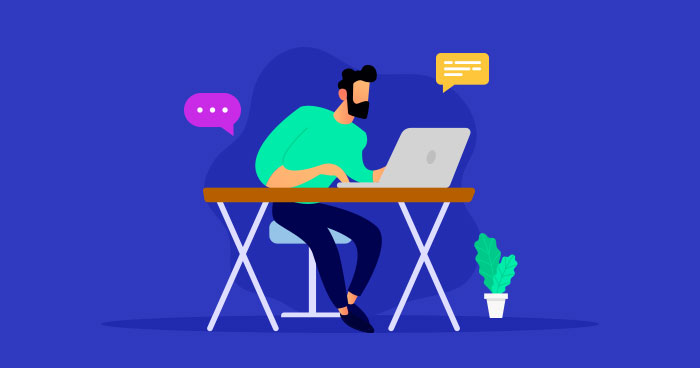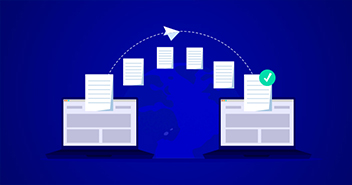
When Germany announced that most employees should be working from home due to Coronavirus, I was already in my seventh year of working from home. It’s fair to say that it is drastically different from commuting to work, having coworkers around you all day, being away from home for 8-9 hours, or just from your regular routine.
When I started working from home, I had to learn new routines and tricks to stay productive. I would easily be distracted by YouTube videos, seemingly important discussions on Facebook or WhatsApp, or just by my significant other being around me and asking for my attention. I was home after all, so why didn’t I engage with my wife?
The truth is that working from home simply is difficult. Even after more than six years, I still have days where I struggle to keep my routines and to get work done. And I think that is ok. There’s no point in beating myself up about being a human and not functioning at 100 percent every single day.
However, there are ways to not just be more productive when working from home but to also make it a more enjoyable experience. Let me share five of the most important lessons I learned from the countless mistakes I made over the past six years.
Lesson 1: Set Clear Schedules Around Your Work Time
I learned the hard way that there is no way around setting schedules for times during which you work and for times during which you do not work. Yes, scheduling time off also matters. Here’s why: we humans tend to go down rabbit holes easily.
It’s cool to be at home all day and to work in your pajamas, I get that. But without clear boundaries, how do you know when you’ve done enough work? On regular workdays, your schedule would be dictated by coming to the office and leaving the office after 8 or 9 hours, maybe 10 if it was a long day.
But you don’t have these triggers for starting to work and ending your work at home. There is no commute, other than making yourself a coffee and getting in front of your computer. And there are no coworkers leaving the office in the afternoon or evening.
Maybe even your significant other is hesitant to tell you to stop working in the evenings because he or she also is new to this situation. It’s easy to overwork yourself when you’re just getting started to work from home. It’s easy to lose track of time.
It’s also easy to interrupt your work with seemingly important tasks. Do you have laundry to do that only takes you 15 minutes? What about your dog that needs to be taken out for a walk? Or the phone call to your friends you didn’t speak to for weeks? Or the fridge that’s already empty again and calls you to go shop for groceries?
There are countless reasons to interrupt your work, that’s why you have to schedule time in your calendar for when you are working and when you are doing the chores. You know, those things you did after you came back from the office. Just because you could do them any time you like doesn’t mean you should.
Setting these clear boundaries around your time also helps your coworkers communicate with you easily. They know when to expect you to answer their chat messages or emails and when to not expect to hear anything from you.
Lesson 2: Reduce Distractions When You’re Working
Having no coworkers around you makes you prone to distract yourself from work. Especially if you have a task you don’t enjoy doing or that is really difficult, you’ll likely be tempted to just open Netflix while you’re working. I certainly struggled with staying focused for more than even just 15 minutes in my first days of working from home.
My phone was always on the desk because I needed to call my clients every now and then, but that also made it very easy to just jump into a game and kill five to ten minutes before working on that difficult task again. And don’t get me started about using my phone or tablet for watching a movie while working. That’s how I consumed many seasons of Breaking Bad and House of Cards.
To get work done, you need to make it a priority to actually focus on the task at hand. I now use the app Forest to block my phone for anywhere between 15 – 90 minutes when I really need to finish a task. There are similar apps for Windows or Mac OS, which I highly recommend you install and give them a try.
Other people living in your house also will be a distraction from time to time. My wife and I definitely needed to deal with this problem. She’d come into my room and ask me about something that was on her mind and I would get angry at her because she interrupted me in my work. Not a pretty situation. Remember that your partner or your kids also are new to this situation. Nobody really knows what works best for you until you try various approaches.
I found that it takes just two things to avoid distracting the other: clear communication and schedules.
Tell your partner that during your working hours, you’re essentially not at home and cannot be disturbed. If she or he still talks to you in those hours, you know that it is something serious and that you should put your work aside. Be respectful of each other’s schedules and make the most out of every time block.
You’ll likely find that you’ll be working fewer hours than you would in the office but can get more done in those hours. During the blocks where you’re not working, just don’t work. Focus on your partner, your chores or just relax – you deserve it if you followed your work routine.
On a side note, investing in a pair of big noise-canceling headphones can also be a good idea. Don’t go for in-ears but try to get a pair of over-ear headphones. The reason is that your partner will realize you’re wearing the over-ear headphones and already knows that you’ve entered the working mode. In-ears are easy to miss and your partner might still be trying to talk to you even if you’re wearing them.
Lesson 3: Make Yourself a Comfortable Workspace
At the end of 2019, my wife and I started rebuilding my home office and moving it into a separate building (an old workshop) on our property. I’m fortunate to have this opportunity of being alone in my home office and being physically separated from any distractions. But even if you have to work in your living room or bedroom, you’ll want to make yourself comfortable in your workspace.
Here’s a picture of what my home office now looks like:

I put a lot of work and money into this and you certainly don’t need to go this overboard with your setup, but I wanted to share some essentials with you that you don’t want to miss if you’re working from home for more than 4-6h every day:
1. Pay Attention to the Ergonomics
Make sure that the top border of your monitor roughly matches your eye-level so that you don’t have to look up to see your monitor. You want to look slightly down so that your neck is relaxed and the muscles are not tense.
You’ll also want to have a good office chair and ideally a sit-stand desk (I got the one from Jarvis and can recommend it, but it’s an investment). I realize that this doesn’t work for all readers of this post but if you have the chance, don’t sacrifice your ergonomics. By the way, this includes a good keyboard and mouse.
2. Have Good Lighting
You don’t want your workspace to be dark. In Germany, there are actual laws that control how bright your office space at least has to be. As you can see in the picture, I do have many lights in my office already. Right now I have nine smart bulbs, two LED strips and the ring light for recording videos – but I still want to add more lighting on the desk because it feels too dark when the blinds are closed (it gets too warm with the blinds open these days).
3. Add Personality to Your Workspace
You’ll want to enjoy your workspace at home because you’ll be spending quite a bit of time in that space. That’s why I have bought a used audio-system from Klipsch, added background lighting to the shelves, got myself two bonsai trees and also built DIY acoustic panels for the walls.
On the shelf that’s barely visible on the right-hand side, you’d see a few Funko Pop figures, a Batman LED lamp and my favorite whiskey in a carafe shaped like a Stormtrooper out of Star Wars. It’s my space, so I can decorate it however I want.
You should treat your workspace similarly. It might just be a desk where you can put a nice plant, a picture or your favorite figurine on – but go for it. I smile every morning when I come into my home office, and that should be your experience, too. And if you can, I’d say go for do-it-yourself projects. I built that shelf for the bonsais on the left, learned how to solder to make the LED lighting work, and also renovated parts of that room myself (e.g. the flooring or painting the walls). It just gives me pleasure to finish small projects that I can see every day.
Bonus Takeaway: Focus on the Small Wins
One last thing I want you to understand is that mental health can become an issue. If you’re used to working from an office with coworkers you could chat with or cheering for you when you got something done or closed a new deal, missing these interactions can put a toll on you.
Every evening, focus on what you got done on that day.
Wrote an email to a client? Great!
Made progress on an important project? You rock!
Set up new appointments to close more leads? Fantastic!
Learned something new today? Knowledge is key, good job!
Don’t rely on others to tell you that you did something well or to praise you. Be your own fan and be ok with being happy.
I am the first one to put a ton of pressure on myself and to expect nothing but excellence from what I do. But is that realistic? Of course not! Nobody has only great days. We all have days that aren’t productive and that’s cool. That would happen in the office just as it happens at home.
But be aware if you’re expecting too much from yourself or losing the fun on things you used to enjoy doing.
Talk to the guys at WP&UP or get help elsewhere if you need to. From my own experience, I can assure you that there’s nothing wrong with asking for help when you feel sad or frustrated. It is pure human nature.
If you want to learn more about working from home and staying sane while doing it, I highly recommend this article: COVID-19 and the New Remote Work Community.
Owais Khan
Owais works as a Marketing Manager at Cloudways (managed hosting platform) where he focuses on growth, demand generation, and strategic partnerships. With more than a decade of experience in digital marketing and B2B, Owais prefers to build systems that help teams achieve their full potential.


